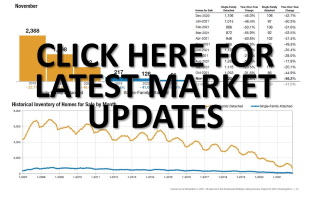RE/MAX National Housing Report for January 2021
Sales Approach Pre-COVID Rate of Increase While Inventory, Days on Market Dwindle
DENVER, Feb. 17, 2021 /PRNewswire/ -- Despite record low inventory, January home sales posted a 13.5% increase over a year ago. That followed four consecutive months of year-over-year sales increases of 19% to 22% on the heels of pandemic lockdowns.
January's year-over-year increase in homes sold represented a sizable gain from the year before and was in line with the pre-COVID months of December 2019 (13.5%) and January 2020 (10.5%).
"January home sales started the year off with a bang despite the current shortage of homes for sale," said Adam Contos, CEO of RE/MAX Holdings, Inc. "January's year-over-year sales increase wasn't as pronounced as what we saw in the back half of 2020, but it was solid by any objective measure – and it signals that 2021 could be an historically good year for housing. Uncommonly low interest rates, the ascent of the millennial homeowner and the prospect of working from anywhere are converging to shape a housing market unlike any other. We could see mortgage rates begin to inch up soon, so now might be an ideal time for homebuyers and sellers to make their move and take advantage of the favorable conditions."
Although the growth in sales moderated a bit, other key metrics showed the aftereffects of housing's 2020 record-setting, second-half recovery:
- January inventory dipped to the lowest level of any time in the 13-year history of the report. The 35.7% drop year over year was also a report record and marked the fifth consecutive month of year-over-year inventory declines over 30%.
- Months Supply of Inventory totaled 1.7 months and equaled the report low set in July 2020 and then tied in August and October.
- The Median Sales Price of $285,000 was a record for the month of January and 11.8% higher than January 2020. It was just 1.7% below the report record of $290,000 set in August 2020 and then tied in October and December.
- Days on Market averaged 40 – a January record and nearly three weeks less than the 59 days of a year ago. The report record for fewest average Days on Market is 36 days, set in November 2020.
Highlights and the local markets leading various metrics for January 2021 include:
Closed Transactions
Of the 53 metro areas surveyed in January 2021, the overall average number of home sales is down 32.1% compared to December 2020, and up 13.5% compared to January 2020. Leading the year-over-year sales percentage increases were San Francisco, CA at +38.5%, Anchorage, AK at +31.7%, and Wilmington/Dover, DE at +30.9%.
Median Sales Price – Median of 53 metro median prices
In January 2021, the median of all 53 metro Median Sales Prices was $285,000, down 1.7% from December 2020, and up +11.8% from January 2020. No metro area saw a year-over-year decrease in Median Sales Price. Forty-five metro areas increased year-over-year by double-digit percentages, led by Boise, ID at +24.3%, Pittsburgh, PA at +21.3%, and Indianapolis, IN at +20.5%.
Days on Market – Average of 53 metro areas
The average Days on Market for homes sold in January 2021 was 40, up three days from the average in December 2020, and down 19 days from the average in January 2020. The metro areas with the lowest Days on Market were Omaha, NE at 18, Boise, ID at 19, and a two-way tie between Cincinnati, OH and Nashville, TN at 21. The highest Days on Market averages were in Des Moines, IA at 99, Miami, FL at 88, and Augusta, ME at 78. Days on Market is the number of days between when a home is first listed in an MLS and a sales contract is signed.
Months Supply of Inventory – Average of 53 metro areas
The number of homes for sale in January 2021 was down 12.1% from December 2020 and down 35.7% from January 2020. Based on the rate of home sales in January 2021, the Months Supply of Inventory decreased to 1.7 compared to 1.9 in December 2020, and decreased compared to 3.5 in January 2020. A six months supply indicates a market balanced equally between buyers and sellers. In January 2021, of the 53 metro areas surveyed, only one metro area, Indianapolis, IN at 9.8, reported a months supply at or over six, which is typically considered a buyer's market. The markets with the lowest Months Supply of Inventory were a two-way tie between Albuquerque, NM and Boise, ID at 0.5, and a four-way tie between Phoenix, AZ, Denver, CO, Seattle, WA, and Salt Lake City, UT at 0.6.
Feel free to contact me and I can help break down exactly what these numbers mean for our local market and for your neighborhood. And lastly, If you or anyone you know is thinking of buying or selling a home - please call or email me. I'm here to help!
Peter Veres
Associate Broker,CRS,ABR,CLHMS,SRES
Elite Asset Management Team - RE/MAX Elite
Cell: 505-362-2005










